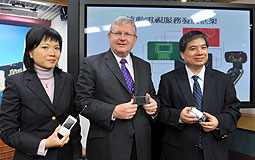 |
| On the go: Permanent Secretary for Commerce & Economic Development (Communications & Technology) Duncan Pescod (centre) briefs the media on the mobile TV services' development framework. |



|
The Commerce & Economic Development Bureau will auction the frequency spectrum for mobile television services as early as mid-2009, hoping to have the services formally launched in 2010.
Announcing the implementation framework for developing the services in Hong Kong today, Permanent Secretary for Commerce & Economic Development (Communications & Technology) Duncan Pescod said the initiative is to enhance the city's position as a regional broadcasting hub.
"The framework aims to create an enabling environment that promotes innovation, investment and competition of local mobile TV services for the benefit of consumers," Mr Pescod said.
It has taken into account the outcome of the consultation exercises conducted in last and this year, and in accordance with a market-led, technology-neutral and facilitating regulatory approach.
"Mobile TV exemplifies the technological advancement and media convergence. The market worldwide has called for timely response from governments and regulators to facilitate the launch and growth of this innovative service," Mr Pescod said.
Framework details
A point-to-multi-point broadcast-type mobile TV services - which can deliver audio-visual content to a critical mass of viewers - will be introduced. It will require additional frequency spectrum and the Telecommunications Authority will allocate one frequency multiplex in UHF Band and two in Band III on a 15-year licence by auction.
The UHF Band can make available 20 mobile TV channels, while six channels can be provided by the two multiplexes in Band III. They will be auctioned as two separate packages and an individual party is not allowed to acquire more than one package.
A 'pro-mobile TV' approach will be adopted, whereby successful bidders will be required to use at least half of the transmission capacity for providing mobile TV content. The remaining capacity can be used to provide other non-mobile TV services, such as digital audio broadcasting or datacasting.
The mandatory percentage will be reviewed in five years. Other telecoms or value-added services, if provided alongside mobile TV services, will continue to be subject to the existing licensing regime.
The operators are required to launch services within 18 months from the unified carrier licence grant. Sharing of hilltop broadcasting facilities is subject to mutual agreements through commercial negotiation, but the Telecommunications Authority has the power to adjudicate.
Self-regulatory regime
A baseline requirement of half of the population will be imposed on the mobile TV services' geographical coverage. Prospective mobile TV operators will have to put up performance bonds to guarantee compliance should they secure the licences.
"Prospective operators will be subject to the payment of a spectrum utilisation fee also determined by auction. This is in line with our established spectrum policy framework which has provided a fair and efficient way in assigning spectrum based on the market-based approach," Mr Pescod said.
As the prospective local broadcast-type mobile TV service is a new and relatively personal service, a light-handed approach will be adopted in regulating their content by general law and industry- promulgated self-regulatory codes of practice.
There will be no ownership or cross-holding restrictions on the operators, nor prescriptions on the mobile TV standards to be adopted.
Currently, the 2.5G and 3G mobile telecommunications platforms allow operators to deliver audio-visual content on demand through streaming technologies.
Go To Top
|



